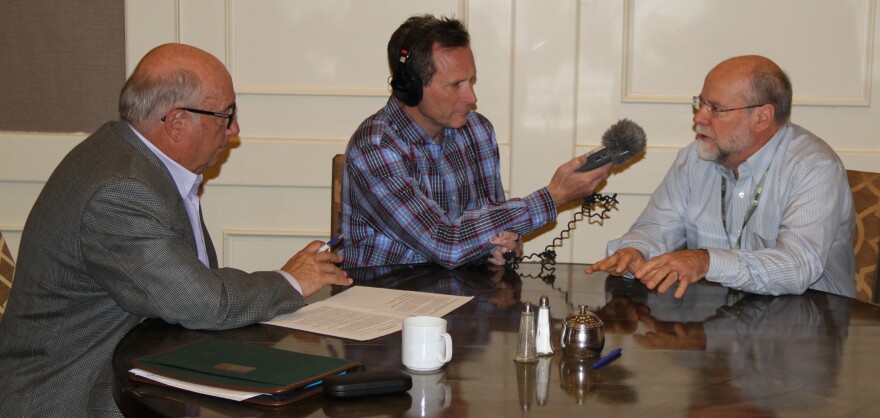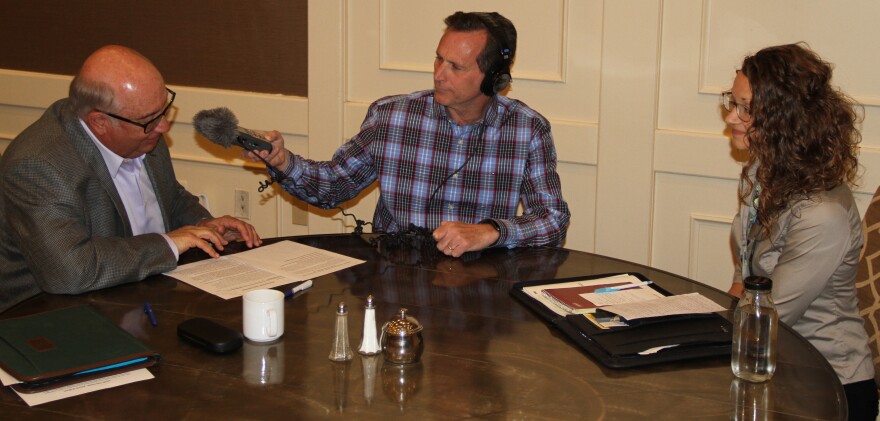Kirk Heinze broadcasts from the always festive and informative occasion of the Michigan Recycling Coalition's 37th Annual Recycling Conference. The theme this year is Looking Back To Move Forward. Kirk opens the broadcast with Kerrin O'Brien. She is the executive director of The Michigan Recycling Coalition.
“We're having market challenges,” O’Brien tells Heinze. “For 15 years we've been dependent on China, who has been the biggest market for our materials. We've invested in building the volume and getting as much material to them as possible, and they don't want it right now. Or they want really clean material that we're having trouble providing because we haven't invested in our material recovery facilities to really get the science specifications that we need to deliver clean quality material to manufacturers. So, we need to reinvest in our material recovery facilities and we need to educate people about how to recycle right.

“What's ironic about this is that when I talk to some people here at our show who buy materials, they have capacity. They need more materials. They're having to go much farther than Michigan to get their materials. If we could align ourselves correctly, we could have them working at capacity.
“But we don't, so we're not able to benefit from the full capacity of our own markets here in this country because we can't even deliver them what they need. So again, we need to get really good at pulling good quality material out of households and businesses and processing it and delivering it in a way that manufacturers can really use it here. The China market will be there. They just need clean good material too.”
O’Brien credits Governor Snyder for getting Michigan thinking more about the importance of recycling to Michigan’s environment and economy. And she says the Whitmer administration is carrying that momentum forward. And she talks about other challenges and opportunities facing the recycling industry as we look forward to the rest of 2019 and into 2020.
“Communities are challenged to fit recycling into their budgets. Oo our challenge is to help them get good at contracting for these services, help them really understand what's the market situation and really help them to bridge the gap because recycling's not going away. We will overcome these challenges so we need local governments to be the steady state and the guidance to what's good in the future. We have to be willing to pay for it, but I think we're worth it.”
Paul England joins Heinze next. Paul is the vice president and general manager Midwest and head of national sales for Pratt Industries, their recycling division.

“We're a global company. We're owned by a family, the Pratt family, out of Australia. Here in North America we have roughly 9,000 employees now. The wonderful thing about Pratt is we are steeped in sustainability. Everything we do is around sustainability. We're a packaging company at heart. We make boxes for anybody you can imagine: Ford, General Motors, Amazon, Lowe's, Home Depot, the whole group. That's our customer base. Our boxes are made out of 100 percent recycled paper. We're the only company in North America that can make that claim, and we're growing.”
Momentum in the recycling industry is being challenged by landfills.
“I have a new competitor for the first time in a long time. This has been a very competitive market for my entire career. I don't know how to combat this newest competitor. That newest competitor is landfills. Cities and municipalities all across the country are making a decision to landfill recyclable materials because there's no home for it. Or if there is a home for it, the cost to process that material is in some cases three to four times higher than the very, very low landfill cost that we've been enjoying in this country for a while. It's going to catch up to us. These holes in the ground that we're stuffing stuff into, they fill up. And when those start to fill up and the landfill costs go up, we're going to be faced with yet another dilemma in this country. We need to get back to recycling, find economic solutions, find solutions that are more creative. It's time for us to get off our rear ends and act.”
As for the future of recycling?
“I see a call to action. I think the country is recognizing that we are in a state of crisis. You turn on the TV, and every day you see what's happening to our oceans and to our environment. And it's not a millennial issue, and it's not an old folks issue. We need to band together and find common solutions. If we do that, I think I have a very optimistic look at the state of recycling.”
Jim Frey co-founded Resource Recycling Systems in 1986. He's been the CEO ever since its inception. He chaired Governor Snyder's recycling advisory council.

In 1986, when the company started out, there wasn't much talk in corporations around the United States about sustainability. And now it seems like they're all talking about it.
“Companies are beginning to understand through a life cycle analysis of their activity what their environmental footprints are. And we now have a depth of data on pretty much every aspect of life here on earth. Whether you're in a rural area, urban area, big city, small city, what is the impact from a life cycle assessment for all the materials we use on a daily basis? It helps everyone understand where the direct interventions can be to improve our impact on the climate. The change that we talk about is a change of reducing greenhouse gas emissions, eliminating litter, eliminating the marine debris, the aquatic, the ocean plastics, and we're now knowledgeable about all that.
“What that means in practice is a huge change in a whole range of practices. And that's really what is sustainability. Some of the commitments that are being made are in a very direct way of essentially everything that I put out there. If I'm a beverage company, everything that I put out there, I'm going to take steps to essentially offset that impact with recycling, with recycled content, with reduction in emissions.
“One of the challenges that we're particularly concerned about here is the fact that they all collectively have made commitments to use recycled content. And those collective commitments are three times what we actually generate through recycling right now. So even though in the news there's been tremendous negative press, you might say, about recycling because of some of the challenges, the China Sword. In reality, the pivot needs to be, not step back, but instead lean in. And that's what was behind Governor Snyder's goal of tripling Michigan's recycling rate. And then also our new governor's goal too, for similarly raising that recycling rate.”
Katie Venechuk is recycling and waste minimization specialist for the Department of Environment, Great Lakes, and Energy.

“We've always had grant programs in place, and we've done our best to get as much money out into the communities as possible. A big part of a successful recycling system in Michigan is local. It's all local. That's where everything drives out from. All of the success of these programs, from infrastructure to education, all of it is important.
“So over the past two years, we have had a variety of grants go out into Michigan communities. A total of about $2.6 million since 2014 has been granted from the City of Kalamazoo to the City of Houghton, to Newberry, to Detroit, to Sanilac County, all over the state.”
What are some other examples of the kinds of infrastructure projects that you support?
“It varies by community because the way that recycling works is different in a rural community than it is in the City of Detroit. What we do is we put out a fairly broad infrastructure grant RFP, and we say, "Bring us your projects. Tell us what will work for you.
“It's varied by year. In some years, we have targeted curbside recycling access, primarily because that's a nationally recognized best practice for increased participation because it's very convenient. Through those programs, we've granted a little over 50,000 carts to be purchased for curbside recycling projects over the years, which is very exciting. It’s things like curbside recycling, drop sites, and infrastructure needs. At a recycling facility, there's thing that need to be done in order to get the materials ready to be sent out to brokers or on to the next step in the recycling process for that particular material. Balers, skid steers, and things of that nature are part of the process to prepare the recyclables to move into market.”
Examples of educational programs EGLE grants have supported in communities vary widely.
“A big part of that is informing residents about how to recycle correctly and where to do it and who to ask if they have questions, especially about any program changes. That's such a pivotal point for a lot of programs is a shift, for example, from a curbside bin, so those smaller bins, to a curbside cart. Or a shift from a dual stream recycling program, where you are asked to separate your materials, to a single stream recycling program, where you are asked to put all of your materials in one bin.
“One of the 2017 grants, for example, was with the City of Kalamazoo, which was doing just that: transitioning from a dual stream program to a single stream program and having residents put everything in one bin. They proposed a large roll-out and huge education campaign with an app called Recycle Coach, billboards, bus wraps, and all kinds of things just so people could see it in a lot of different places and recognize, ‘My city is making a change, and I can be a part of this.’
“Some of the opportunities are that we have very passionate people in this industry who are trying to make these things happen. There are a lot of national and international challenges around recycling right now. Unfortunately, the challenges are what a lot of people hear in the news these days as opposed to those good news stories and investments and program shifts that are happening. A lot of the opportunity lies in the fact that many people want to recycle more. There's a lot of regional collaboration happening and people sharing expertise and knowledge about what works in similar types of communities. People can replicate those best management practices in other areas.”
For more information on grants available and how to apply, visit Michigan.gov/MIrecycles.
MSU Today airs Sunday afternoons at 4:00 on 105.1 FM and AM 870.

